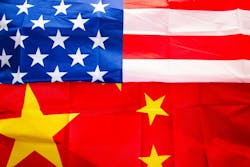China Curbs Exports of Key Chipmaking Components to US
Beijing said Tuesday it would restrict exports to the United States of some key components in making semiconductors after Washington announced curbs targeting China's ability to make advanced chips.
Among the materials banned from export are metals gallium, antimony and germanium, Beijing's commerce ministry said in a statement that cited "national security" concerns.
Exports of graphite, another key component, will also be subject to "stricter reviews of end-users and end-uses," the ministry said."To safeguard national security interests and fulfill international obligations such as non-proliferation, China has decided to strengthen export controls on relevant dual-use items to the United States," Beijing said.
"Any organization or individual in any country or region violating the relevant regulations will be held accountable according to the law," it added.
In its own latest curbs, Washington on Monday announced restrictions on sales, without additional permission, to 140 companies including Chinese chip firms Piotech and SiCarrier.
They also impact Naura Technology Group, which makes chip production equipment, according to the U.S. Commerce Department.
The move expands Washington's efforts to curb exports of state-of-the-art chips to China, which can be used in advanced weapons systems and artificial intelligence.
The new U.S. rules also include controls on two dozen types of chip-making equipment and three kinds of software tools for developing or producing semiconductors.
Beijing swiftly vowed to defend its interests, saying the United States "abuses export control measures" and has "hindered normal economic and trade exchanges."
- 'Weaponized' trade -
And on Tuesday, China said Washington had "politicized and weaponized economic, trade and technological issues" as it unveiled its own export curbs.
The moves also restrict the exports of "dual-use items to United States military users or for military purposes," Beijing said.
China accounts for 94% of the world's production of gallium -- used in integrated circuits, LEDs and photovoltaic panels -- according to a report by the European Union published this year.
For germanium, essential for fibre optics and infrared, China makes up 83% of production.
Beijing last year had already tightened restrictions on exporters of the metals, requiring them to provide information on the final recipient and give details about their end use.
But the curbs unveiled Tuesday now ban them outright.
It had also previously restricted curbs on exports of certain types of graphite --also key to making batteries for electric vehicles.
"The move is clearly a retaliatory strike at the U.S.," Dylan Loh, an assistant professor at Singapore's Nanyang Technological University, told AFP.
"It drives home an important point which is that China is not completely passive (and) there are some cards it can play and hit the U.S. with as well with regards to chips," Loh added.
These "back and forth curbs" could create supply chain disruption, as well as inflationary pressures, should they affect trade for third parties, said Chong Ja Ian, an associate professor of political science from the National University of Singapore.
But while the metals play critical roles in high-tech industries, they are upstream in the supply chain, which means their immediate impact on production "is limited," Brady Wang, associate director at technology market research firm Counterpoint, told AFP.
"As the US-China trade tensions have persisted for some time, many intermediary manufacturers in the supply chain have been stockpiling these materials," Wang added.
-'Be cautious' -
Multiple Chinese trade associations on Tuesday released similarly worded statements urging members to seek local alternatives to U.S. chips.
"We call on domestic companies to ... be cautious when procuring U.S. chips, seek to expand cooperation with chip companies in other countries and regions and actively use chips produced and manufactured in China by domestic and foreign enterprises," the Internet Society of China said in a statement.
The China Association of Automobile Manufacturers accused Washington of having "arbitrarily amended the control rules, seriously affecting the stable supply of U.S. chip products".
"The Chinese auto industry's trust and confidence in the procurement of U.S. chip products is being shaken, and U.S. auto chip products are no longer reliable and safe," the association said.
All rights reserved ©2024 Agence France-Presse.
About the Author
Agence France-Presse
Copyright Agence France-Presse, 2002-2025. AFP text, photos, graphics and logos shall not be reproduced, published, broadcast, rewritten for broadcast or publication or redistributed directly or indirectly in any medium. AFP shall not be held liable for any delays, inaccuracies, errors or omissions in any AFP content, or for any actions taken in consequence.

